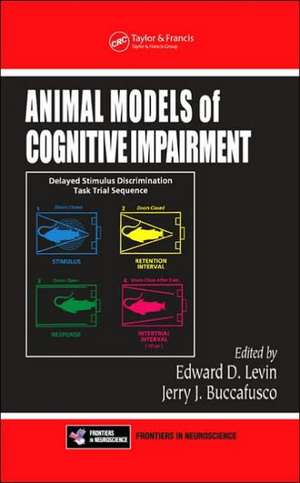Animal Models of Cognitive Impairment
Editat de Edward D. Levin, Jerry J. Buccafuscoen Limba Engleză Hardback – 22 iun 2006
The book comprehensively discusses a wide variety of animal models of cognitive impairment, including genetic, lesion, pharmacological, and aging related impairments. It also explores the significance of this research in regards to the treatment of various addictions and disorders such as stroke, autism, Alzheimer’s, schizophrenia, and ADHD.
Edited by two renowned authorities in the field, Animal Models of Cognitive Impairment is a timely book that provides integrated coverage of cutting-edge research that concerns neuronal systems relevant to cognitive function and dysfunction.
Preț: 1046.81 lei
Preț vechi: 1444.39 lei
-28% Nou
Puncte Express: 1570
Preț estimativ în valută:
200.30€ • 209.73$ • 166.14£
200.30€ • 209.73$ • 166.14£
Comandă specială
Livrare economică 19 martie-02 aprilie
Doresc să fiu notificat când acest titlu va fi disponibil:
Se trimite...
Preluare comenzi: 021 569.72.76
Specificații
ISBN-13: 9780849328343
ISBN-10: 0849328349
Pagini: 394
Ilustrații: 43 b/w images and 12 tables
Dimensiuni: 156 x 234 x 26 mm
Greutate: 0.69 kg
Ediția:1
Editura: CRC Press
Colecția CRC Press
ISBN-10: 0849328349
Pagini: 394
Ilustrații: 43 b/w images and 12 tables
Dimensiuni: 156 x 234 x 26 mm
Greutate: 0.69 kg
Ediția:1
Editura: CRC Press
Colecția CRC Press
Public țintă
Academic and Professional ReferenceCuprins
Introduction. Pharmacologic Models. Toxicologic Models. Mouse Genetic Models. Model Applications And Future Developments.
Notă biografică
Edward D. Levin, Jerry J. Buccafusco
Descriere
Animal models of cognitive function, including learning, memory, and attention, are critical for determining the neurobehavioral basis for cognition and for the development of new therapeutic treatments for cognitive impairment. Animal Models of Cognitive Impairment features an integrated approach that combines molecular and neurochemical approaches in translational models with behavioral and clinical applications. The text also discusses current research on genetic, lesion, pharmacological toxicant, and aging models. The book then explores the significance of this research to the treatment of various addictions and disorders such as stroke, autism, Alzheimer’s, schizophrenia, and ADHD.
